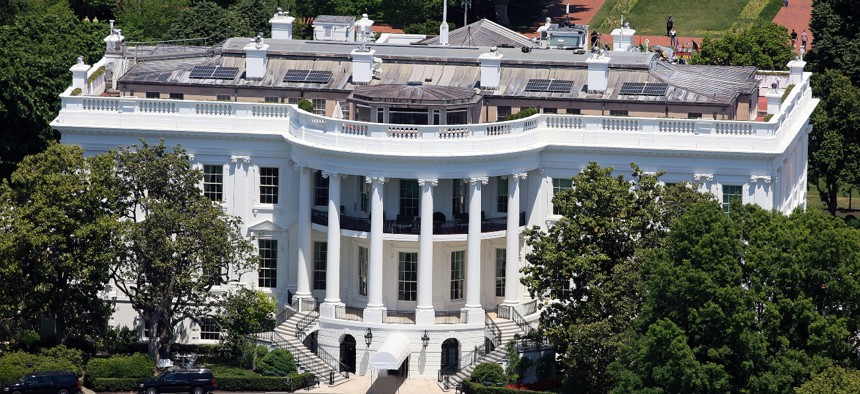
The White House argued its employees were technically appointed by the president and therefore should not hold the same rights as other civil servants. Hisham Ibrahim/Getty Images
White House Can't Just Retaliate Against and Discipline Its Employees Willy-Nilly, Panel Rules
Non-political appointees at the White House are now entitled to civil service protections.
Career employees at the White House are entitled to appeal suspensions and firings and maintain whistleblower protections, according to a federal board that ruled against administrations that have sought leniency in dealing with workers in close proximity to the president.
The Merit Systems Protection Board sided with White House staffers in a pair of recent rulings, saying they were entitled to the same civil service protections that are afforded to the rest of the federal workforce. In cases that dated back to the Obama and Trump administrations, the White House argued its employees were technically appointed by the president and therefore should not hold the same rights as other civil servants. The three new members on MSPB’s central board, working to reduce the unprecedented backlog at the agency thanks to its five years without a quorum, said that argument was not supported by the legislative history of civil service laws or the historical interpretations of those statutes by the White House itself.
In one case, Daniel Moncada, who worked in the Executive Office of the President's Office of Administration since 2002, successfully saw his firing reduced to a 60-day suspension after appealing to an administrative judge at MSPB. Moncada faced allegations of misusing a government vehicle to drop off lunch for his girlfriend and improper handling of an email. The Obama White House appealed that decision to MSPB’s central board, saying the quasi-judicial agency had no authority to rule on cases involving its personnel.
Federal statute outlining employee rights spells out specific agencies whose employees cannot appeal to MSPB, such as the FBI, but the board noted those exemptions do not include the White House. Presidential appointees also do not have standing before MSPB and the administration argued that as head of the White House, the president appoints the employees who work there and they therefore should not have appeal rights. The board countered, however, that the White House was twisting the meaning of “presidential appointee” and personnel such as Moncada hold an expectation to continue their employment from one administration to the next. In writing the statute, the board said, lawmakers clearly meant to exclude political appointees who do not carry over through multiple administrations.
In another case, Peggy Maloney, also in the Office of Administration, said a series of adverse actions were taken against her to retaliate against her protected whistleblower disclosures. The nature of the disclosures were not made public in the board’s decision. Maloney alleged the personnel actions taken against her began in 2015 and appeared to stretch multiple administrations, as she took her case to MSPB while President Trump was in office. The White House moved to dismiss her case, arguing its employees are not entitled to whistleblower protections, and an administrative judge ruled in its favor.
The newly reconstituted central board reversed that decision, however, saying specifically that Office of Administration employees qualified under the “independent establishment” clause of the civil service statute. The White House previously interpreted various labor protection laws to include its staff, the board said. The panel sent the case back to the administrative judge to reconsider its decision in light of its ruling.







